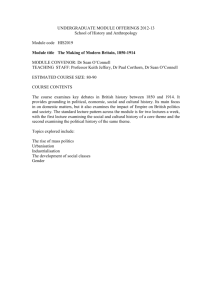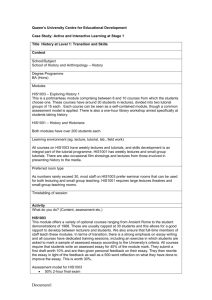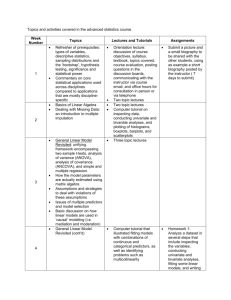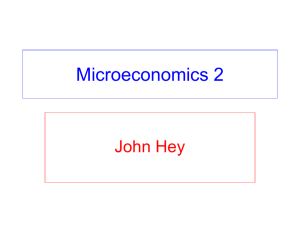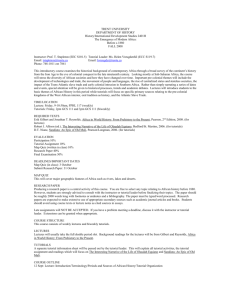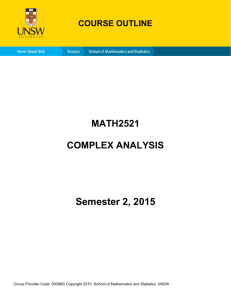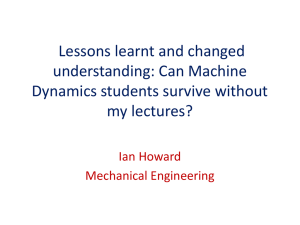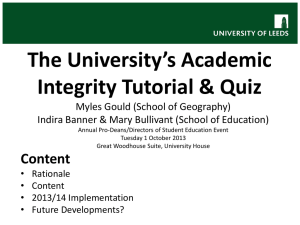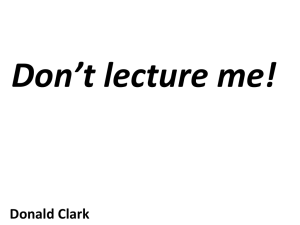h2_mathematics_expectations_v2
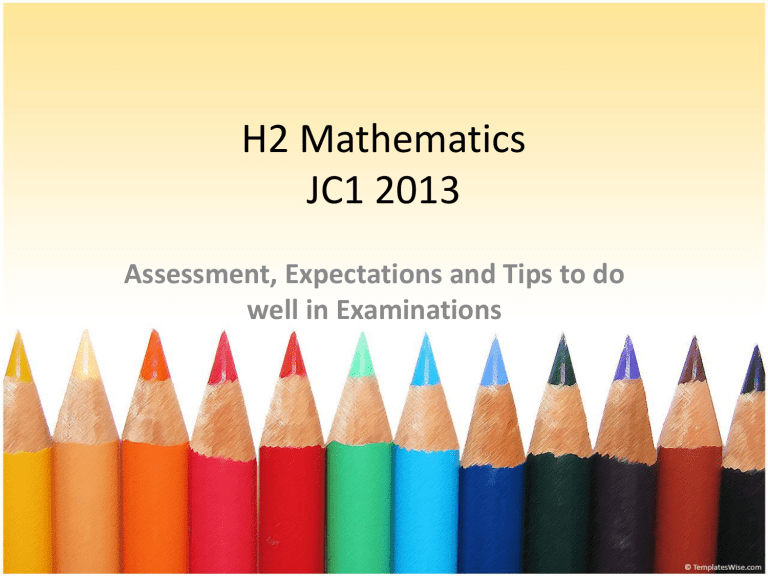
H2 Mathematics
JC1 2013
Assessment, Expectations and Tips to do well in Examinations
Assessment for JC 1
• Promotion to JC 2:
2H2 passes and 2 H1 passes
(excluding H1 PW and H1 MT)
• Promotional Marks consist of:
– MSA (Term 2 Week 3): 5%
– Continuous Assessment: 10%
– Common Test (End June- term 3):20%
– Final Exam ( From 23 Sept to Oct): 65%
Assessment for JC 1
• Continuous Assessment consist of:
– Math Task (3%)
– Attitude marks (2%) – Based on completed assignments and the quality of assignments handed up and learning attitude displayed in class
– Lecture Test (5%) (Term 3)
Structure of H2 Mathematics
• The Big Five of Pure Mathematics (70%):
– Graphing & Functions (JC1) (4 Chapters)
– Calculus (JC1) (6 Chapters)
– Summation, Sequences & MOD (JC 1) (3 Chapters)
– Vectors (JC 2) (2 Chapters)
– Complex Numbers (JC 2) (2 Chapters)
Structure of H2 Mathematics
• Statistics (30%)(JC 2):
– Permutations and Combinations
– Probability
– Binomial & Poisson Distributions
– Normal Distribution and Approximations
– Sampling and the Central Limit Theorem
– Hypothesis Testing
– Linear Regression
What does all these mean?
• Aim high
– “A” at A Levels require perfect solutions for a number of questions/topics.
– You must score “A” or at least a “B” at the A levels
• We can only go through each topic only ONCE.
• You need to learn it right the first time round.
– Review your own gaps and mistakes in particular topics through the worksheets/exams/tests.
– Keep a record of these to help you revise before the Examinations/A Levels.
Lectures
• Read your lecture notes before the lecture
– View the Videos for the lecture (on Ask and Learn)
– Note down the questions that need to be answered
• During the lecture
– Be an Active Learner
• Listen out for the answers to the questions that you asked before the lecture
• Do the Hands-On Exercises!
• Jot Questions during lecture and ask tutors later
• After the Lecture
– Consolidate your learning by re-reading your notes before attempting your tutorial sheets
Conduct During Lectures
• Please visit the toilets before lectures
– Ask for permission from tutors if you need to move out of the lecture hall
• Be punctual for lectures and settle down quickly.
• Bring Lectures Notes and GC.
• Maths Rep to take attendance and ensure proper conduct (non disruptive behaviour) for the class during lectures.
Conduct During Lectures
• Do not discuss among your friends when the lecture is on. Discuss only when permission is granted, e.g. during hands-on exercises
• Handphones and other electronic devices will be confiscated if used during lectures.
Tutorial Lessons (Flipped Classroom)
Preparation of Tutorial Lessons
• Start working on your tutorials as soon as you can (immediately after the lecture)
• If you get stuck, please view the relevant videos (on Ask and Learn)
• If you are still unsure, please ask your tutor AS
SOON AS POSSIBLE.
Preparation for Tutorial Lessons
• Preparation for tutorial lessons is IMPORTANT
– Tutors will NOT be answering questions that you can simply look up in your lecture notes for the information or hear on the videos.
– Tutors will concentrate on
INTEGRATING/IMPROVING your knowledge and skills
Tutorial Lessons (Flipped Classroom)
During Tutorial Lessons
• You will be given one assignment in class which you are expected to work on during class time. It is usually similar but harder than the tutorials given.
• You will be required to hand it in at the end of the lesson.
Writing of Topic Summaries
• You are encouraged to get ready a notebook to write down important formulas and things that you have found useful in solving problems.
• Keep it with you always and refer to it when doing questions and for consultations
• Examples include
– Concept/Mind maps of the topic
– Frequently used formulas
– Important concepts and explanations
– Mistakes made by you that you want to revise before examination
Example of A Topic Summary
Consultations
• Always read your notes and check with your friends before asking your tutor
• Book a slot with your tutors through your Maths
Rep
• Bring your Topic Summary Notebook and other materials
• Prepare your questions/doubts
– You should NOT be asking basic information. This shows a lack of effort on your part.
– Be clear on what you do NOT understand and need help in.
Preparation for Exams
• Go through your Summaries & Lecture Notes
• Practice Revision Packages
– Given out every major exam
• Practice 10 Year Series (topical)
• Work towards 1.5 min/mark
(2.5 hrs for doing 3 hr paper and 0.5h for checking)
• Practice at least two full papers
Tips
• Do NOT procrastinate!
– JC is a very hectic and stressful period.
– Work builds up very quickly.
– Once work is assigned, do it immediately. Do not leave what can be done today for tomorrow.
• Be Consistent in your Learning
– Mathematical Thinking/skills are sequential and it will affect your mastery of other topics adversely if you neglect some topics
– You cannot mug at the last minute and expect to pass
(let alone do well)
Tips
• Self Direction/Initiative is Required
– Be active in asking questions and consultations
– Learn from one another
• Be Organised
– File all assignments
– Keep a record of mistakes/things to revise before the exams
Tips
• Personal Learning is Important
– You must be able to solve problems using the material taught
– You must assimilate/understand the methods and tricks taught
– You cannot copy your peers’ work or read through solutions and assume you can solve problems.
– The test is to do an unseen problem yourself and see how far you can solve the problem.
Recommended
Textbooks/Guidebooks
Textbooks:
• A Level Mathematics H2 (Volume 1 & 2)
– Author: Alfred Low
– Publisher: James Collins Asia
Guidebooks:
• A Complete Guide to H2 Maths Guide (Pure Mathematics &
Statistics)
– Author: Lois Chee
– Publisher: Educational Publishing House Pte Ltd
• A Level H2 Mathematics Topical Practice
– Author: Lois Chee
– Publisher: Educational Publishing House Pte Ltd
Term 1 Maths Notes
• Buy Math notes from the photocopy shop
($5.75 per person)
• Math Rep to buy for the class
• Due to movement of classes, please inform the photocopy lady if there is an increase/decrease in the number of students doing H2 Math in your class
Temporary Website for Videos
http://sajcmath.wordpress.com/
Lecture Seating
• LT CC
– 13A05, 13S01, 13S02, 13S07, 13S11, 13S15,
13S18, 13S19, 13S20, 13S20, 13S23, 13S26,
13S27, 13S28
• LT 1
– 13A07, 13S06, 13S10, 13S14, 13S16, 13S17,
13S21, 13S22, 13S24, 13S25
• LT 2
– 13A03, 13A04, 13A08, 13S03, 13S04, 13S05,
13S08, 13S09, 13S12, 13S13
